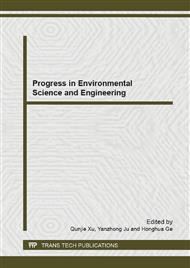p.849
p.857
p.862
p.868
p.872
p.880
p.884
p.888
p.894
Comprehensive Water Quality Evaluation Based on Variable Fuzzy Model
Abstract:
The environmental quality evaluation of seawater is a multicomponent and multi-factorial one, the water environment quality classification standards and the level of water pollution and so on are some vague concepts .Currently available evaluation models of water quality have more or less some shortage, Based on the variable fuzzy theory, the paper is to establish the variable fuzzy evaluation model of seawater quality and apply the approach to the comprehensive evaluation of Jiaozhou Bay seawater quality. The practice indicates that the model is simple, and can reasonably determine the sample's the relative membership degree and the relative membership functions to the different index standard ranges and be able to properly rate the sample by taking the stable result as the result of the comprehensive evaluation of seawater quality through changing the model and its parameters (a and p parameters change, change for four models, including a linear, three nonlinear) thereby providing a new approach and method for multi-objective comprehensive evaluation and decision-making in marine environmental field
Info:
Periodical:
Pages:
872-879
Citation:
Online since:
December 2012
Authors:
Keywords:
Price:
Сopyright:
© 2013 Trans Tech Publications Ltd. All Rights Reserved
Share:
Citation:


